
Giovanni Giorgio Moroder is an Italian composer, songwriter, and record producer. Dubbed the "Father of Disco", Moroder is credited with pioneering euro disco and electronic dance music. His work with synthesizers had a large influence on several music genres such as Hi-NRG, Italo disco, new wave, house and techno music.

Philip (Phil) Oakey is an English singer, songwriter and record producer. He is best known as the lead singer, songwriter, and co-founder of English synth-pop band The Human League. Aside from The Human League, he has had an extensive solo music career and collaborated with numerous other artists and producers.

"I Feel Love" is a song by Donna Summer. Produced and co-written by Giorgio Moroder and Pete Bellotte, it was recorded for Summer's fifth studio album, I Remember Yesterday (1977). The album concept was to have each track evoke a different musical decade; for "I Feel Love", the team aimed to create a futuristic mood, employing a Moog synthesizer.

A Love Trilogy is the third studio album by American singer and songwriter Donna Summer. It was released on March 5, 1976, just eight months after her international breakthrough with the single and album of the same name – "Love to Love You Baby". The bold, sexual nature of that particular song had earned Summer the title 'the first lady of love'. By now Summer's work was being distributed in the U.S. by Casablanca Records, and the label encouraged Summer, Moroder and team to continue in this vein. A Love Trilogy uses the first side for one long disco track in three distinct movements 'Try Me', 'I Know', 'We Can Make It', and coalescing into the "love trilogy" of the title – "Try Me, I Know We Can Make It". Side two contained three additional erotic disco songs, including a cover of Barry Manilow's "Could It Be Magic". The album's artwork showed Summer floating light-heartedly through the clouds, again adding to the image of her as a fantasy figure.
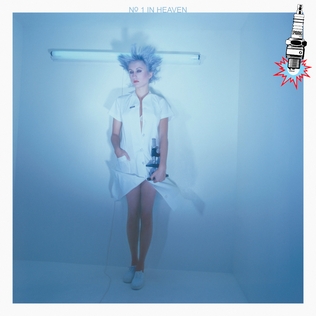
Nº 1 in Heaven is the eighth album by Sparks. Recorded with Italian disco producer Giorgio Moroder, it marked a change of musical direction for the group and became influential on later synth-pop bands.
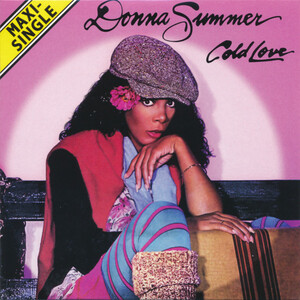
"Cold Love" is a song by American singer Donna Summer, released as the second single from her album The Wanderer. The song was written by Harold Faltermeyer, Keith Forsey and Pete Bellotte and produced by Bellotte and Giorgio Moroder. It peaked at No. 33 in the Billboard Hot 100, and No. 41 in Cash Box. Summer earned a Grammy nomination for Best Female Rock Vocal Performance.
Device was a short-lived American pop-rock trio from the mid 1980s, formed by keyboardist, bassist and vocalist Holly Knight, frontman Paul Engemann and guitarist Gene Black.
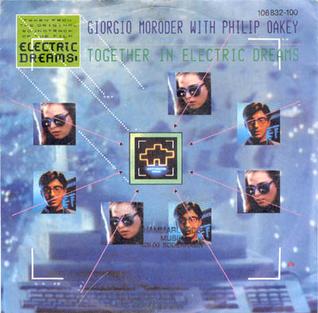
"Together in Electric Dreams" is a song by the British singer and composer Philip Oakey and Italian composer and producer Giorgio Moroder. It was written by Oakey and Moroder and recorded for the original soundtrack of the film Electric Dreams (1984). It later formed part of the joint album Philip Oakey & Giorgio Moroder, released in 1985.

"Chase" is a 1978 instrumental composition by Italian music producer Giorgio Moroder. It was released as a single during 1978 from his Academy Award-winning soundtrack album Midnight Express (1978), and was a disco instrumental that was subsequently extended and released as a maxi single. It made the Billboard Hot 100 in January 1979, peaking at number 33, and the UK Singles Chart, peaking at number 48.

"Beat the Clock" is a disco single by the American rock duo Sparks, which was released in 1979. It is named after the game show Beat the Clock.

Colour All My Days is the second solo album by the English singer Limahl, released on EMI Records in 1986.

American Gigolo is the soundtrack album to the 1980 movie of the same name, starring Richard Gere and Lauren Hutton. The music was composed and performed by Italian musician Giorgio Moroder and was released worldwide on the Polydor label. It peaked at #7 in the Billboard 200 album charts. All the cuts from the soundtrack also went to number two for five weeks on the disco/dance charts.

"The Number One Song in Heaven" is a disco song by the American rock duo Sparks. Released as a single in 1979, the song was produced and co-written by electro-disco producer Giorgio Moroder. It became a top 20 hit in the UK, where it peaked at number 14. In addition to the standard black vinyl, both the 7" and 12" versions of the single were issued in a variety of coloured vinyl releases.

Love Life is the third studio album by American new wave band Berlin. It was released on March 12, 1984, by Geffen Records. Recorded between October and December 1983, the album features production from Mike Howlett, Giorgio Moroder, and Richie Zito. Four singles were released from the album, including "No More Words", which became the band's first top-40 single on the US Billboard Hot 100, peaking at number 23.
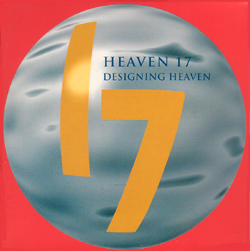
"Designing Heaven" is a song by the British new wave and synth-pop band Heaven 17, released in 1996 as the lead single from their sixth studio album Bigger Than America. It was written by Glenn Gregory, Ian Craig Marsh and Martyn Ware, and produced by Marsh and Ware under their production company British Electric Foundation. The song peaked at No. 128 in the UK. It was the band's first single of new material since 1988. A music video was filmed to promote the single.
"From Here to Eternity" is a song by Italian singer, songwriter, and producer Giorgio Moroder, released in 1977 as a single from an album of the same name.
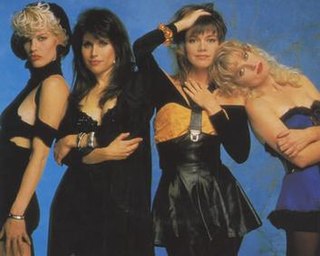
Big Trouble was an American female pop group, who recorded one album and released a total of two minor hit singles.

Big Trouble is the debut and only studio album from the female pop group Big Trouble, released in 1988.
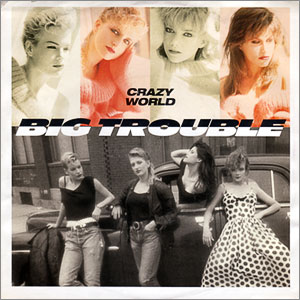
"Crazy World" is a song by American female pop group Big Trouble, which was released in 1987 as the lead single from their only studio album, Big Trouble. It was written by Giorgio Moroder and Tom Whitlock, and produced by Moroder.

"Right Here, Right Now" is a song recorded by Italian producer Giorgio Moroder, featuring the vocals of Kylie Minogue, for Moroder's studio album Déjà Vu. The song had a minor impact on singles chart in Europe and attained the top position of the US Dance Club Songs.


















